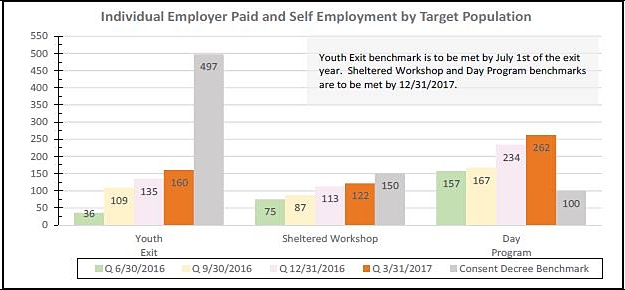Mixed Reviews on Employment From RI Consent Decree Monitor; Judge to Hear Compliance Status
/By Gina Macris
Rhode Island has made “uneven” progress in finding jobs for adults with developmental disabilities during the first quarter of 2017, according to an independent court monitor who oversees implementation of a 2014 federal consent decree intended to give adults with intellectual challenges more choice over how they live their lives.
The monitor, Charles Moseley, has filed his latest report in advance of a U.S. District Court hearing July 28 on compliance with the decree, which grew out of findings by the U.S. Department of Justice that Rhode relied excessively on sheltered workshops paying sub-minimum wage and on segregated non-work programs.
Moseley said 62 individuals got jobs between January and March of this year, increasing the total number of placements to 544. That total is 340 more than the number of persons who had jobs 12 months earlier, according to data submitted by the state. Moseley said the number of placements for January through March of 2017 fell below an average of 85 placements per quarter for each of the three previous quarters.
The first quarter of 2017 coincided with the launch of the state’s new incentive program for private agencies providing job-related services, but Moseley’s report did not make reference to that program. (Read related article.) Complete employment statistics for April through June are not yet available.
Moseley’s report broke down the statistics according to three categories of adults with developmental disabilities who are protected by the consent decree: those who had been in segregated sheltered workshops; those who had been in segregated day care facilities, and young adults who are at risk for long-term segregation after they leave high school. The consent decree also covers a fourth category of individuals; high school special education students who are at risk of segregation as adults. But the consent decree does not require the state to help them find jobs while they are still in school.
According to Moseley’s report, among the so-called “day target population”, a total of 262 had jobs on March 31, an increase of 28 during the first quarter of the year. The total of 262 is more than twice the number the consent decree requires by Jan. 1, 2018. There are a total of 1,541 individuals in this category protected by the consent decree.
In the “sheltered workshop target population,” 9 individuals got jobs between January and March, bringing the total employed since Jan. 1, 2016 to 122. That number represents 81 percent of the consent decree benchmark of 150 placements for former sheltered workshop employees by Jan.1, 2018, according to Moseley’s report. At last count, there were a total of 658 current or former sheltered workshop employees protected by the consent decree.
Moseley said young adults, or members of the “youth exit target population,” gained 25 new job placements between January and March, for a total of 160 placements in that category. The consent decree requires job placements for all young adults the same year they leave high school. Moseley said that with the current census of the “youth exit target population” at 497, the state had achieved only 32 percent of the number of jobs required by the consent decree for young adults.
Source: RI Division of Developmental Disabilities
For the 12-month period ending March 31, the total number of individuals protected by the consent decree grew from 2,962 to 3,621, an increase of 659, which Moseley attributed to the state’s improved data collection.
Moseley has repeatedly emphasized individualized career development planning as an integral part of the job search. Equally important is individualized benefits counseling, which Moseley has said is necessary to allow individuals to make informed choices about whether potential jobs will adversely affect Medicaid and other types of government supports.
The latest statistics show that about 63 percent of all persons protected by the consent decree have career development plans and about 67 percent of those who are employed have had benefits counseling, according to Moseley.
Friday’s court hearing will be at 10 a.m. in Room 310, the historic library of the federal court building in Kennedy Plaza in Providence. U.S. District Court Judge John J. McConnell, Jr. will preside.







